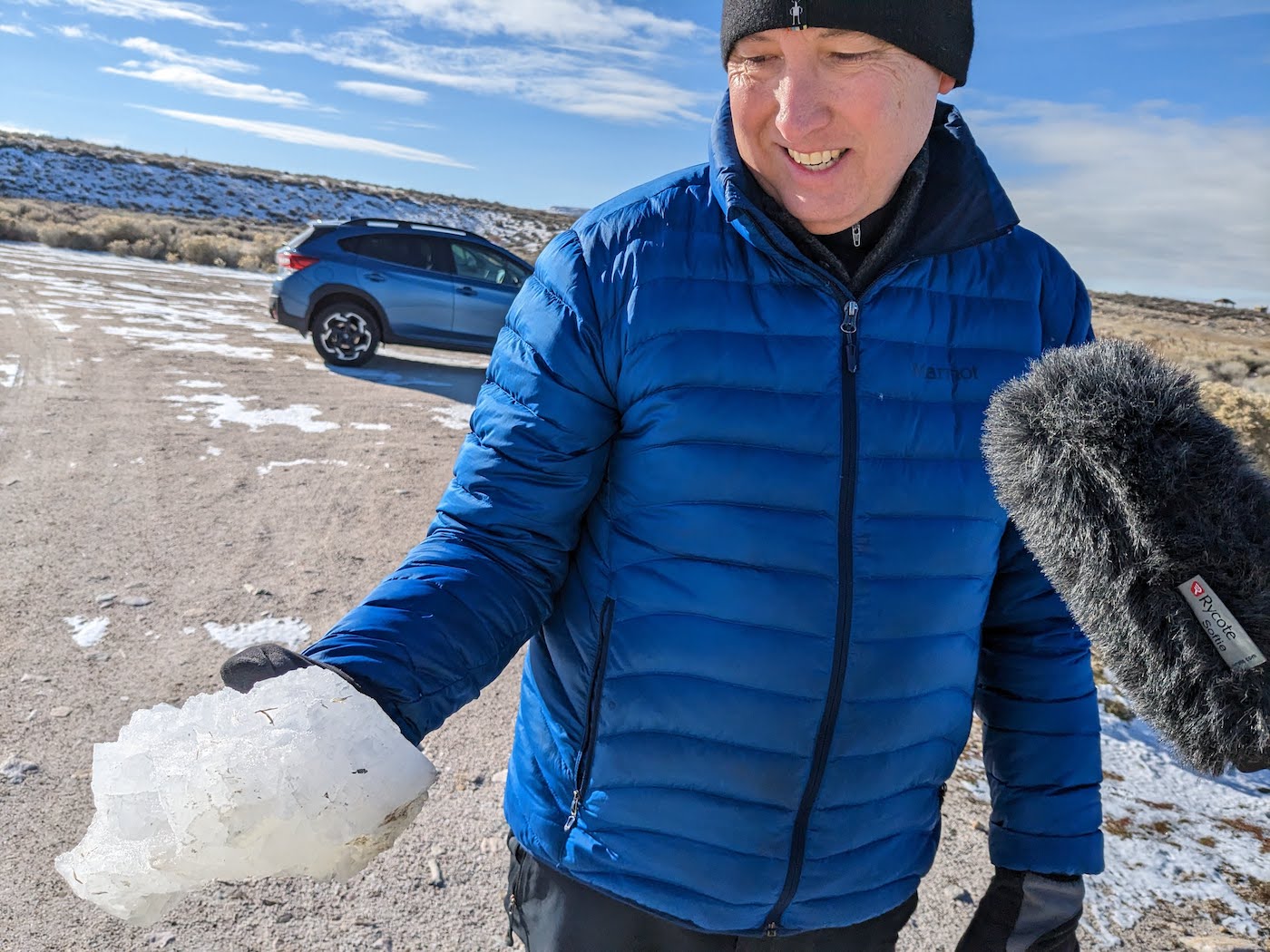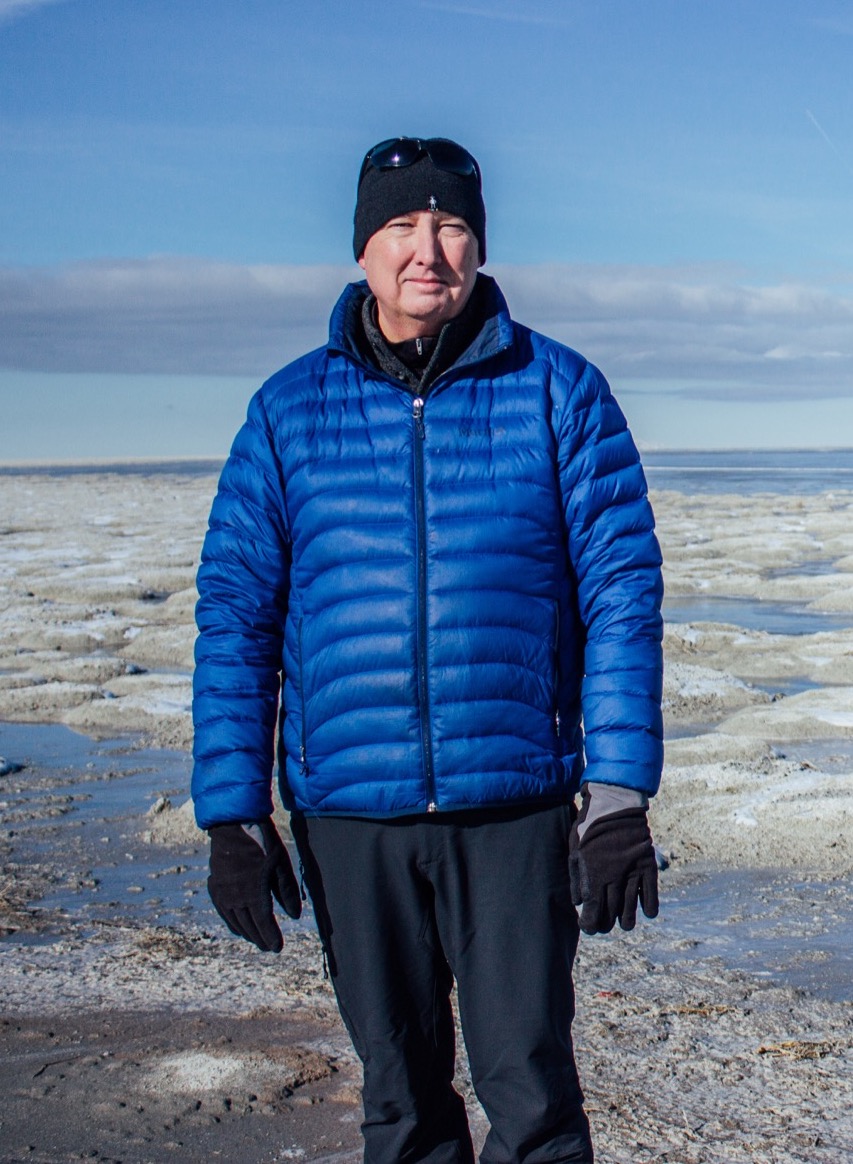Kevin Perry On Doing The Right Thing
Dr. Kevin Perry, an atmospheric scientist working to save the Great Salt Lake, talks about finding meaningful directions in his research.
This article is from our limited-run newsletter series, Sincerely Science. Read more from the series, or sign up to receive all editions of this series in your inbox.

Dr. Kevin Perry, an atmospheric scientist at the University of Utah, is one of the scientists working to save the Great Salt Lake from drying up. The lake needs all the help it can get—informing citizens and policymakers on the science of the lake is critical to keep it going for years to come. Lately, Perry says more of his time is spent communicating about his research than actually doing it.
In 2021, Perry presented the findings of a two-year research project to determine the contents of the dust coming off of the dried Great Salt Lake surface. He found that not only was the dust a source of pollution, but it also released toxic chemicals like arsenic and other heavy metals into the air. The potentially harmful air pollutant would only worsen if the lake wasn’t restored—and he’s been trying to get Utahns to listen ever since.
While Perry was out buying groceries, a cashier struck up a conversation with him about the Great Salt Lake. The cashier said he had created a website to warn community members about dust pollutants coming off the Great Salt Lake and started to explain the risk of the exposed lakebed to Perry.
“I laughed and I said, ‘You don’t know who I am, but you know the toxic dust that you’re talking about? That’s my scientific research,’” Perry says. “That kind of blew me away…when [I saw] somebody who has no scientific background was inspired enough to spend their time and effort trying to save the Great Salt Lake.”
Perry feels grateful that his and his colleagues’ efforts have energized members of the community to create change. But when it comes to his personal goals, he hesitates to pat himself on the back.
“I’m still wondering when I’m going to be successful,” Perry jokes. “I often wonder, couldn’t anybody just do what I’m doing and replace me? In terms of success, what I’m really happy about is when students use [their] degree as a springboard to do something that really matters to them.”
Perry recalls first being excited about the weather as a three-year-old watching gust fronts in Kansas City.
Gust fronts are the outflow from thunderstorms that dramatically reduce the air temperature in a short period of time. “The temperature will drop 15 degrees in 30 seconds, and you’ll get this big gust of wind and rain. I was all in on that sort of thing,” Perry says. “I originally thought I was going to be a TV weatherman.”
When Perry was in grade school, even though he loved science, particularly weather and geology, he didn’t feel encouraged to pursue it professionally. “I frankly just forgot about it and left it behind,” he says.
Years later, a teaching assistant took Perry under her wing while he was struggling in an undergraduate physics class. For the first time, he was able to solve difficult problems he never would have on his own. “[She] taught me how to break down problems into smaller components, into what we know and don’t know,” he says. “[She was] just one of those people that touch your life that you have no way of expressing gratitude to. But she transformed me into a scientist. I still didn’t get a good grade in the class, but I learned a lot.”
As a professor, Perry focuses on how his students can gain the most from his classes, even if they don’t necessarily become scientists themselves. To him, it’s more about finding the topic that ignites their curiosity. “Having an advanced degree can help you get a job, but what it really does is give you a license to explore. I’m super proud when my students go off and do something that’s totally unrelated to what they did for their graduate work,” he says.

In his scientific research, Perry realized that he was drawn to topics that tended to lead to advocacy projects. But not everyone he worked with has agreed that science and advocacy go hand in hand.
Shortly after the 9/11 attacks on the World Trade Center, Perry collaborated with the New York Department of Energy to analyze human health risks of the dust from the collapsed buildings. To their astonishment, the researchers found high concentrations of ultra-fine silica particles in the dust. “They’re not water soluble, so your body has no way of removing these,” says Perry. “And then you build up scar tissue across [your lungs], and now [you] can’t exchange oxygen with the environment.”
Perry knew that first responders and those living in the area would be permanently harmed by the dust, but at the time the EPA wasn’t cautioning them about the risks. “The EPA was saying that everything was safe. And what the EPA should have been saying was… you should take precautions because there could be unknowns,” he says. Perry recalls feeling at odds with the advising organizations when he published his team’s findings, even though it would save lives.
“That one almost got people fired,” he says.
Perry felt like using his title as a scientist to advocate for causes he believed in was “commendable, but against everything I was taught… to do.” He drew inspiration from the scientists who collaborated with policymakers to heal the hole in the ozone layer, understanding that his field of research had broad public health impacts as well. But taking his work beyond the lab isn’t in the job description—Perry would have to take a leap of faith to make the change his research suggested was necessary.
“We’re taught at a very young age, when we’re new scientists, that we need to remain objective. We don’t need to advocate for policies, we just need to let the science speak for itself,” Perry says. “But if you just write your paper and you don’t communicate it to people who can actually do something about it, then the problem will persist.”
For Perry, science isn’t just about learning the facts. It’s a thought process of asking questions, breaking down problems, and reviewing what we know and don’t know—and that’s important, no matter how it’s applied. He’s comfortable wearing multiple hats and bridging his passion for science and public service. “Science is not intended to be just a job,” Perry says. “It’s intended to be a journey.”
Emma Lee Gometz is Science Friday’s Digital Producer of Engagement. She writes SciFri’s “Science Goes To The Movies” series and is a journalist and illustrator based in Queens, NY.